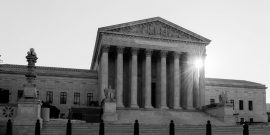In its turn to history, the Court continues to look for national, judicially enforceable answers to questions on which the Constitution offers silence.
Culture's Challenge to Constitutionalism
Democracy in America is justly famous for showing that democratic government depends not only on institutions but on culture. The American culture Tocqueville described was individualistic but socially cooperative, creating all kinds of civic associations. Its society was religious but under the domination of no one church or sect. It was egalitarian, but not deeply envious and resentful of success and wealth of others.
Certainly the subtext, if not the text of this great work, is that the culture was as responsible for a flourishing society as any institutions set up by the Constitution. Indeed, the institutions of the Constitution might be considered mere extensions of the culture of civil society at the time. For instance, because civic associations provided social benefits and indeed disciplined the character of citizens, the relatively light and limited government of the Constitution was both possible and effective.
But what happens when that Constitution becomes part of a wholly different culture less conducive to mutual aid and self-discipline? A lack of congruence between culture and law is the greatest challenge to legalistic constitutionalism, including its most persuasive form, originalism. Gouverneur Morris, the man who wrote the Constitution, summed up this dilemma best in expressing his pessimism about the French Revolution: The French “want an American Constitution without reflecting that they have not the American citizens to support it.”
Consider just part of our contemporary culture, that of social media, and particularly Facebook. The social relations it helps create are wholly different from those celebrated by Tocqueville and perhaps less than democratically salubrious. In Tocqueville’s America, when people came together in civic associations, they saw one another in the round. But through Facebook people generally present carefully curated, airbrushed versions of themselves.
This means that the most important fake news on Facebook may ultimately not be political but personal. The feed is not exactly false but it is misleading about the fundamentals of lives around us. One could well imagine from looking at Facebook feeds that almost everyone is going from one triumph to another, interrupted only by fabulous vacations. It a recipe for social envy.
To be sure, Facebook does not constitute the sum and substance of social relations today. But no one can doubt, given other changes, particularly the decline in the amount of time spent in traditional civic associations, that our culture today does not much resemble that of Tocqueville’s America. Many conservatives complain that libertarians and classical liberals who favor legalistic constitutionalism mistakenly ignore that cultural chasm. Their view is that if we do not save the culture, good constitutional law will not protect us.
The difficulty with this argument is that culture is a very complex fabric, dependent on the decisions of millions of people and the technology of the time. No social policy or even set of policies is likely to restore the social virtues of Tocqueville’s America. And the power the government would have to wield to transform culture is wholly antithetical to the individualism that was a key component of that vanished time. Thus, the conservative critique of a legalism that ignores culture is more powerful than its proposed solution. And because of the weakness of its alternative policy program, the critique does not ultimately undermine the case for enforcing the original Constitution, even if we should look for policies consistent with its meaning to promote a culture that will better complement it.
Constitutional legalism is no panacea, but it is the best we lawyers can do.



